Business & Management
Uganda’s IGE Fellows (2023) Inaugurated: -Challenged to Analyse the Underpinnings of Biomass Dependence in Uganda
Published
3 years agoon
By
Jane Anyango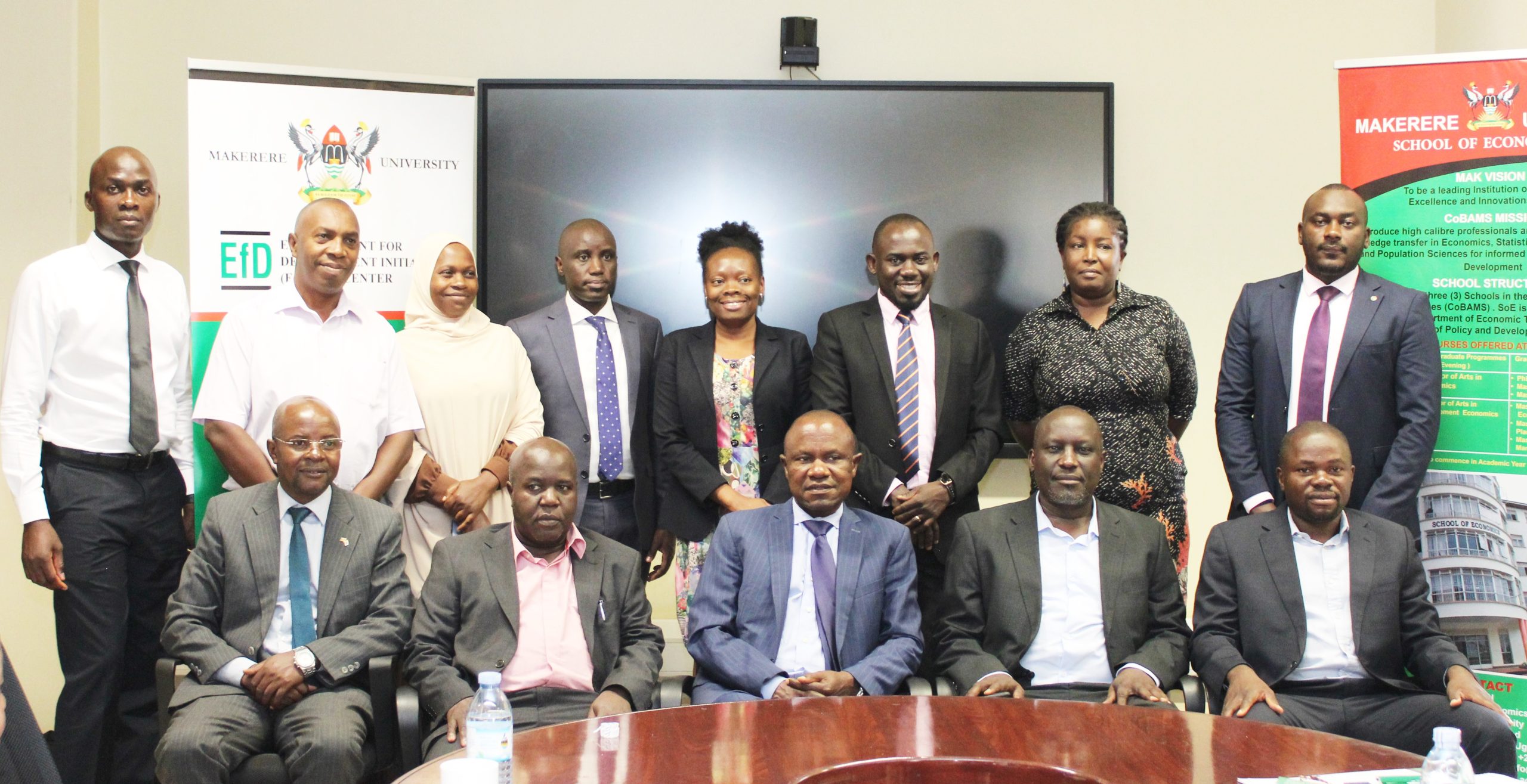
Uganda’s Inclusive Green Economy (IGE) 2023 Cohort has been inaugurated at Makerere University at a function that was presided over by the Principal College of Business and Management Sciences Associate Prof. Eria Hisali.
The ceremony held on 26th July 2023, was witnessed by the Dean School of Economics Associate Professor, Ibrahim Okumu and the Director EfD-Mak Centre Prof. Edward Bbaale.
This is the second Uganda’s IGE Cohort composed of six fellows that were appointed by the Permanent Secretaries from Government ministries and Agencies in response to the letter from the EfD-Mak centre and the Swedish Ambassador to Uganda.
Two fellows were appointed from each ministry and one agency. They are; Eng. Ssekitoleko Simon Peter (Assistant Commissioner) and Tony Joshua Mwesigwa (Economist) from Ministry of Energy and Mineral Development; Mr. Kandwanaho Jonan ( Senior Planner Chemical Industries) and Kebirunge Elizabeth (Planner, Natural Resources and Environment) from the National Planning Authority; Mr. Paul Byamugisha (Senior Climate Finance Officer) and Ms. Flavia Namagembe (Climate Finance Officer) from the newly established Climate Change Financing Unit , Ministry of Finance, Planning and Economic Development.
Presiding over the inauguration, Prof. Eria Hisali welcomed the IGE fellows and thanked them for taking interest in the EfD activities adding that the university looks forward to an enduring relationship.
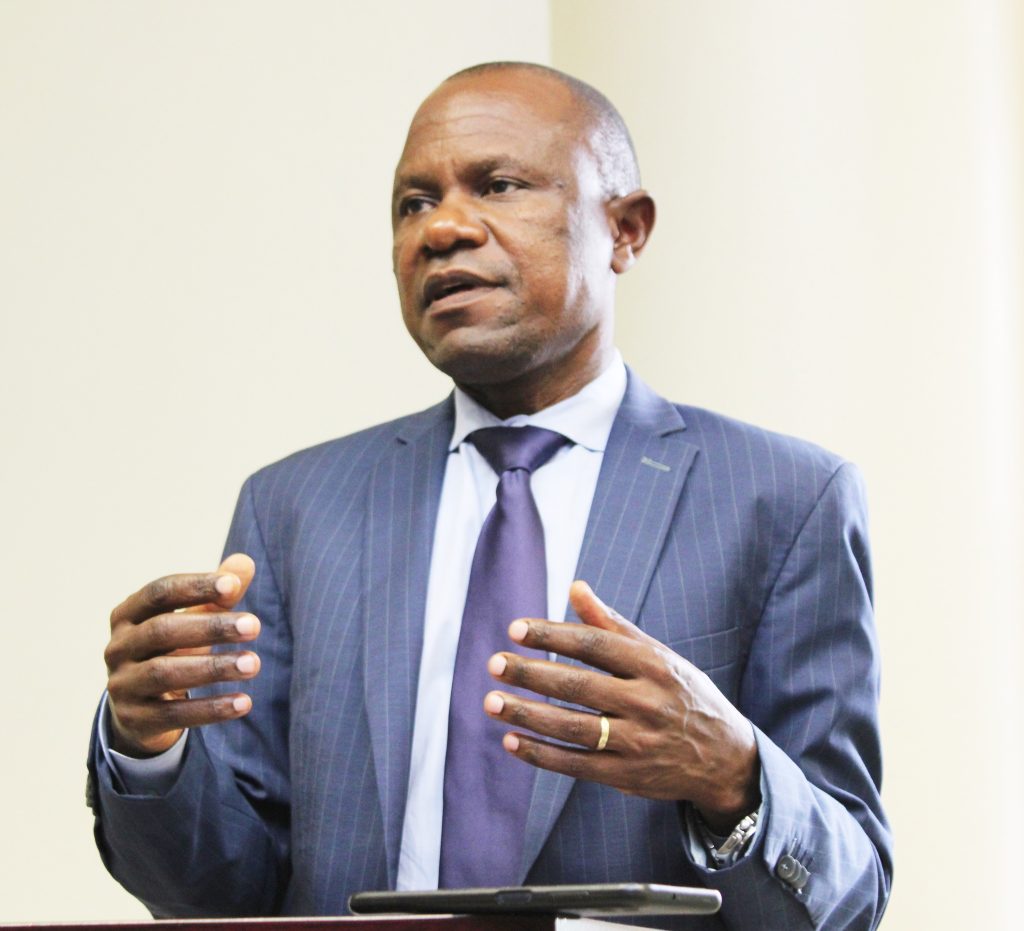
As part of the inaugural activities, a policy dialogue on, “The Dangers of Biomass Utilisation and Adoption to Renewable Clean Energy in Uganda”, was held.
Reports according to Prof. Hisali suggest that up to 90% of Uganda’s energy is based on utilisation of biomass while in the rural areas, up to 100% of the energy used is from biomass.
Continuing on that path especially certain biomass like charcoal, the Principal urged that is not only unsustainable, but also an existential threat that fits into environmental degradation seen in climate change.
Prof. Hisali also reported that the livelihood for the bulk of Ugandan people derives directly from nature hence, any threat from environment to the climate becomes a big challenge that all must take interest in addressing.
“The question then we should be asking as we discuss biomass is, “Do we all -those in government, civil society and the people in the rural and urban centres understand the dangers of biomass reliance the same way. Or is it rather the case that once you see food on your table, it does not matter what has gone into the preliminary processes?”
Hisali contends that the different stakeholders are at different levels of appreciation of the extent of the problem at hand. He called for the need to harmonise all stakeholder’s appreciation of the problem.
“Once we have the harmonisation, then, we can begin discussing issues of adoption. In the process of building a harmonised understanding, we should also try to find out what is mediating the behaviour that we see because what we see is a behavioural decision making issue. Is it poverty..? because even when we make very good recommendations on adoption of clean and renewable energy in Uganda, without taking first in consideration what is mediating these decision making, then it will be like any other discussion”. He added
He advised colleagues in the EfD-Mak Centre to graduate to preparing background papers that give a proper context and anchor while commissioning studies.
Fellows Challenged to Diagnose and Understand the Underpinnings of Biomass Dependence in Uganda in order offer correct innovative energy options
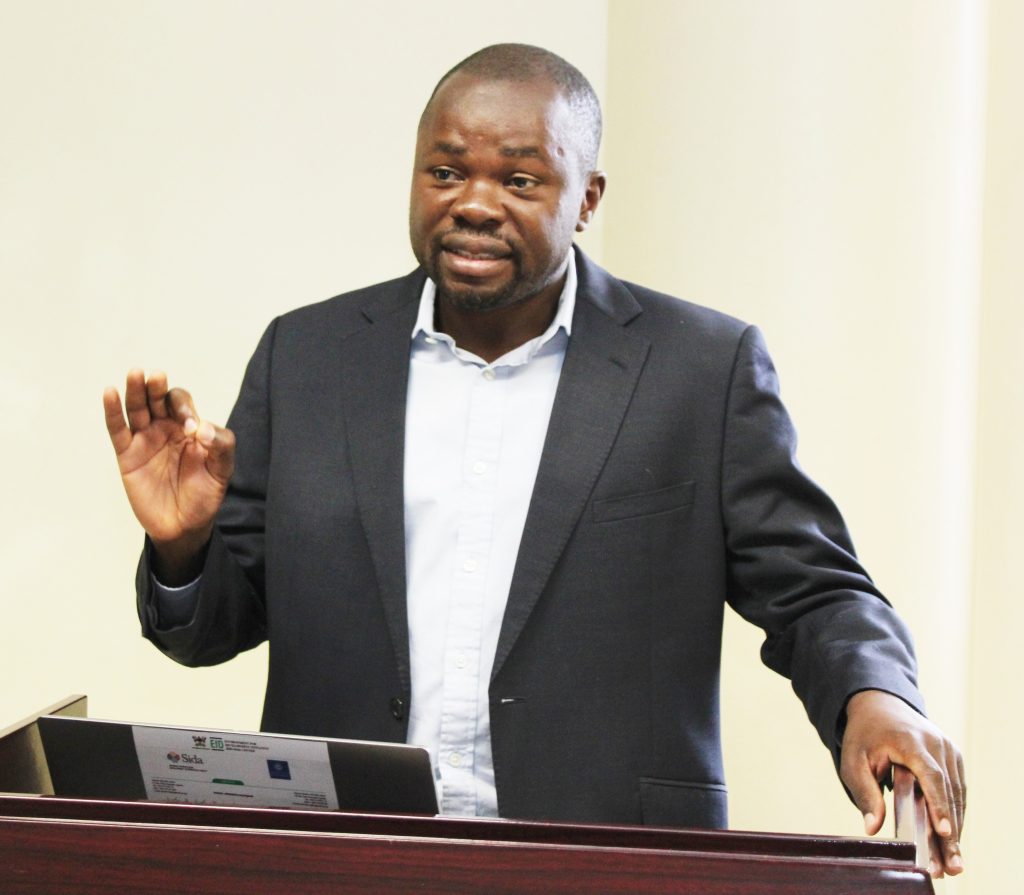
Hisali informed the IGE fellows that discussion for the day gives them a sense of the challenges ahead and to which they must contribute solutions.
Whereas the fellows will be coming to the university, the Professor warned that the centre will not take an entirely academic approach but rather to have an engagement that is practical and one that speaks to the realities of the challenges seen by all in the environment.
“You are privileged that you are doing practical work and having knowledge of the problems faced in Uganda… be as practical as possible and share your experiences as the only way to understanding the extend of the problem and what is causing it to correctly figure out correct measures to address these problems”, Hisali advised.
The Dean School of Economics Assoc. Prof. Ibrahim Okumu hailed the EfD Mak secretariat for continuing with the research agenda of the Makerere university and sustaining the visibility of university within the space of matters concerning the environment.
“Today we are speaking on an issue of Biomass that is central to the existence to mankind and a threat to livelihood. We have had the loss of forest cover which is a threat to the ecosystem that forests serve”, The Dean noted.
The EfD-Mak centre according to Dr. Okumu is committed to engaging with government through the IGE fellows to speak on matters of debate regarding the environment.
“Our interest in engaging the IGE Fellows is to ensure that we can visibly and with real impact have our foothold into policy space and indeed IGE fellows are our foot soldiers in that policy space.
I hope that through the capacity building that you will pick up through this process will impact your policy engagement”, He said.
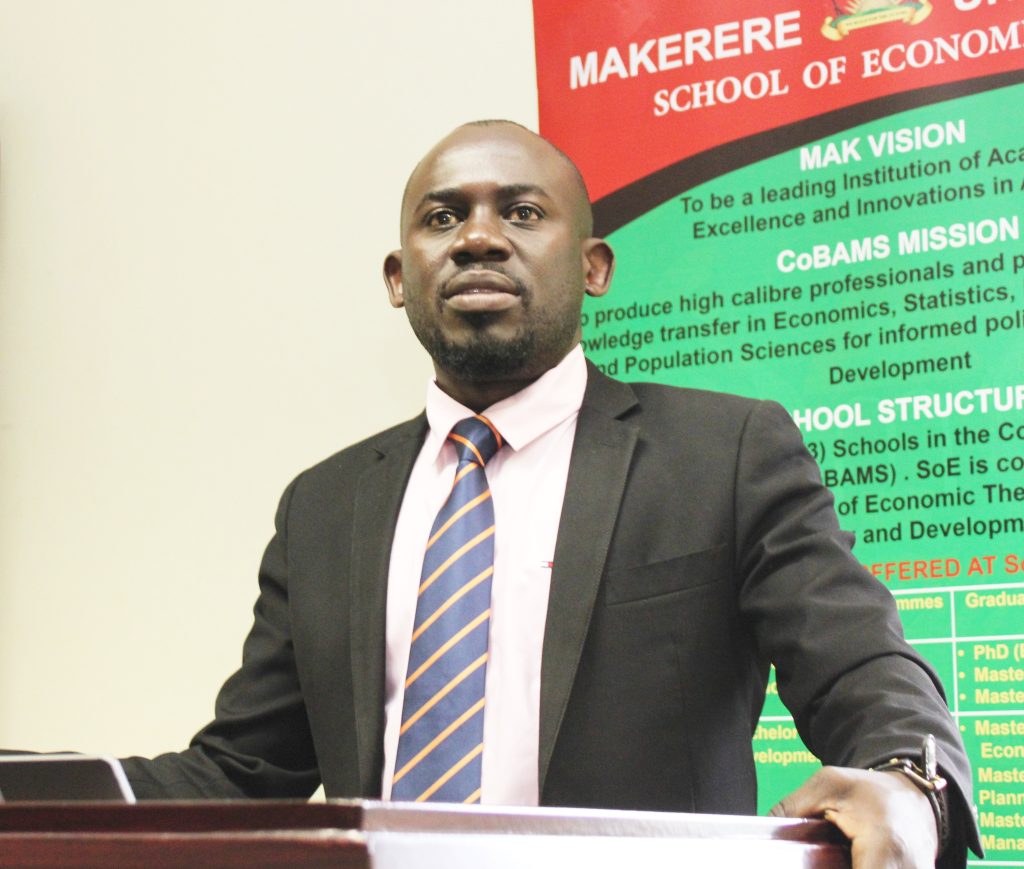
Presenting the background paper, the IGE Engagement Specialist Mr. Peter Babyenda said the reliance on biomass energy is a key global challenge toward environmental protection and reversing climate change effects.
Globally, Babyenda said, over 3 billion people rely on biomass energy to meet their energy requirements while in SSA, over 900 million people mainly rely on biomass fuels for cooking.
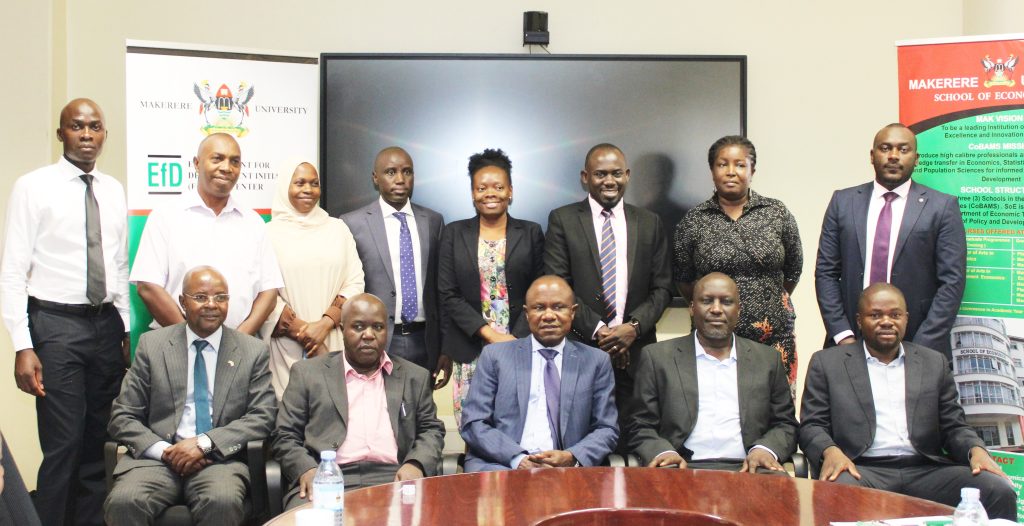
“In Uganda , over 85 percent of the population uses firewood and 13 percent use charcoal for cooking.
An additional 2.3 million tons of tree biomass is consumed in brick making and by educational institutions, among others”. Mr. Babyenda report.
Please click on the attachment for details on Biomass utilisation in Uganda below:
You may like
-


Uganda Martyrs Namugongo Students Turn Organic Waste into Soap in an Innovative School Project on Sustainable Waste Management
-


Olivia Nakisita and the Quiet Urgency of Adolescent Refugee Health
-


Mastercard Foundation Scholars embrace and honour their rich cultural diversity
-
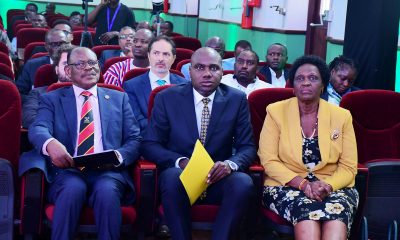

First African Symposium underscores the role of the Centre of Excellence for Africa Climate-Sensitive Macroeconomic Modelling
-


Makerere Launches Scholarly Guide, Calls for Increased Research, Publication and Innovation in Africa
-
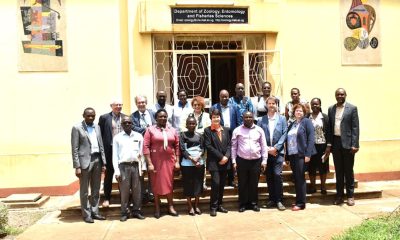

BOKU University Charts New Collaboration Strategies with Mak’s Department of Zoology, Entomology & Fisheries Sciences
Business & Management
First African Symposium underscores the role of the Centre of Excellence for Africa Climate-Sensitive Macroeconomic Modelling
Published
2 days agoon
February 18, 2026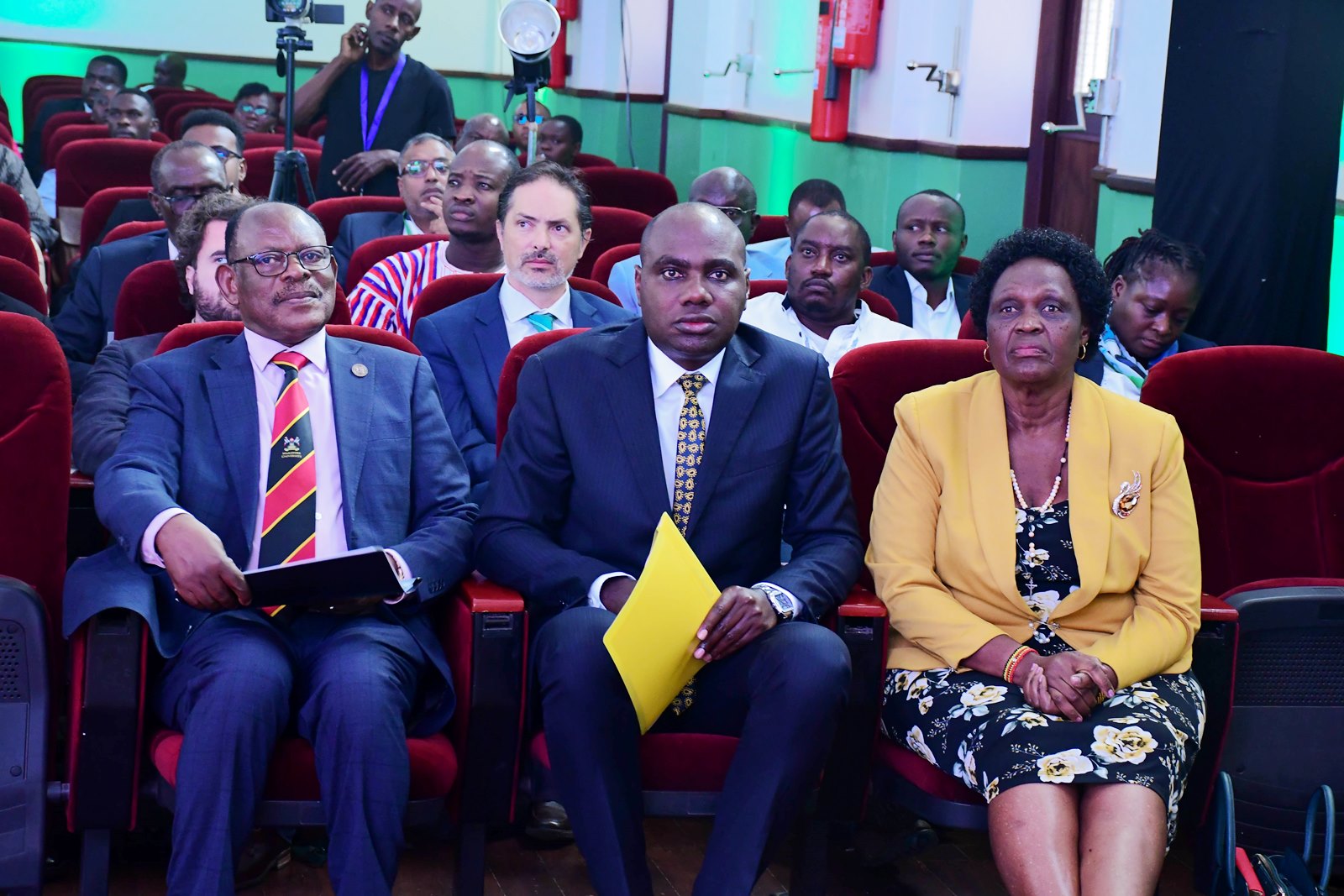
During the First African Symposium on Natural Capital Accounting and Climate-Sensitive Macroeconomic Modelling held on 12th and 13th February 2026 at Makerere University-Kampala, notable speakers and experts urged government ministries and universities to initiate institutionalized approaches and frameworks to mitigate the natural capital account threats in Africa.
The discourse centred on the theme, Climate-Sensitive Macroeconomics: Rethinking Growth in Africa’s Natural Resource Base, which explored innovative approaches to integrate natural capital and climate risks into economic planning. The symposium highlighted that Africa’s economic transformation must be climate-informed and resilience-driven.
Committed to African-led capacity building, Makerere University is taking the lead in engaging other African universities to support fiscal policy in climate change modelling and analysis.
The participants and stakeholders across the globe lauded Makerere University, for partnering with the Ministry of Finance, Planning and Economic Development (MoFPED), and the Environment for Development Initiative (EfD), to establish the Centre of Excellence for Africa Climate-Sensitive Macroeconomic Modelling (CEACM).
Highlights about the CEACM
During the symposium, the Vice Chancellor of Makerere University-Prof. Barnabas Nawangwe, the Principal, College of Business and Management Sciences-Prof. Edward Bbaale, the Dean of the School of Economics-Associate Professor Ibrahim Mike Okumu, Dr. Peter Babyenda, Dr. Wilson Asiimwe and other members of faculty, articulated the mandate of the CEACM.
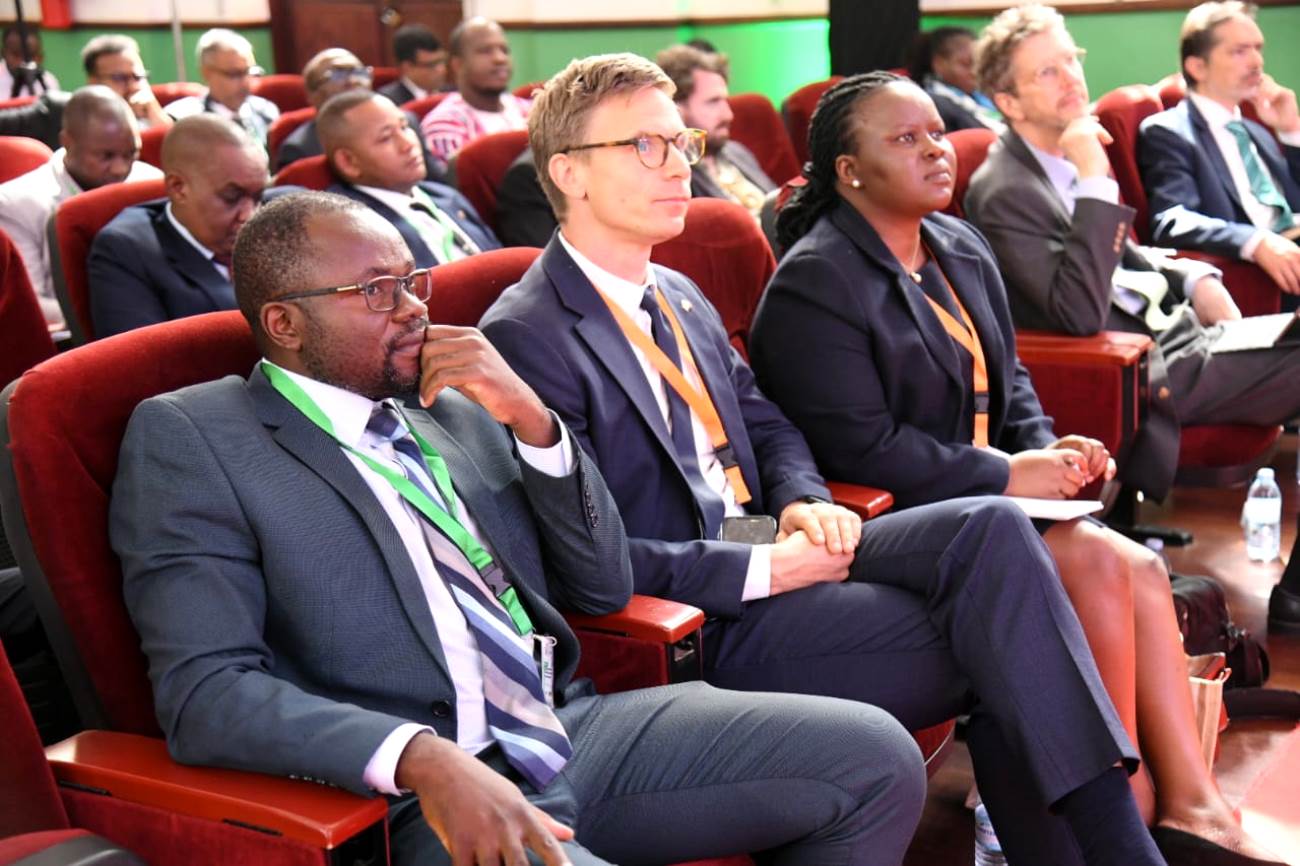
Situated at Makerere University, CEACM is anchored within the School of Economics in the Department of Policy and Development Economics, under the College of Business and Management Sciences. It is aligned with the Master of Science in Economic Policy and Investment Modelling, a program jointly facilitated by Makerere University, the Ministry of Finance, Planning and Economic Development and the Bank of Uganda.
Promotion of Africa-led Modelling
Addressing the participants, the University leadership and faculty, highlighted the Centre’s strong commitment to Africa-led modelling, as its key distinguishing feature.
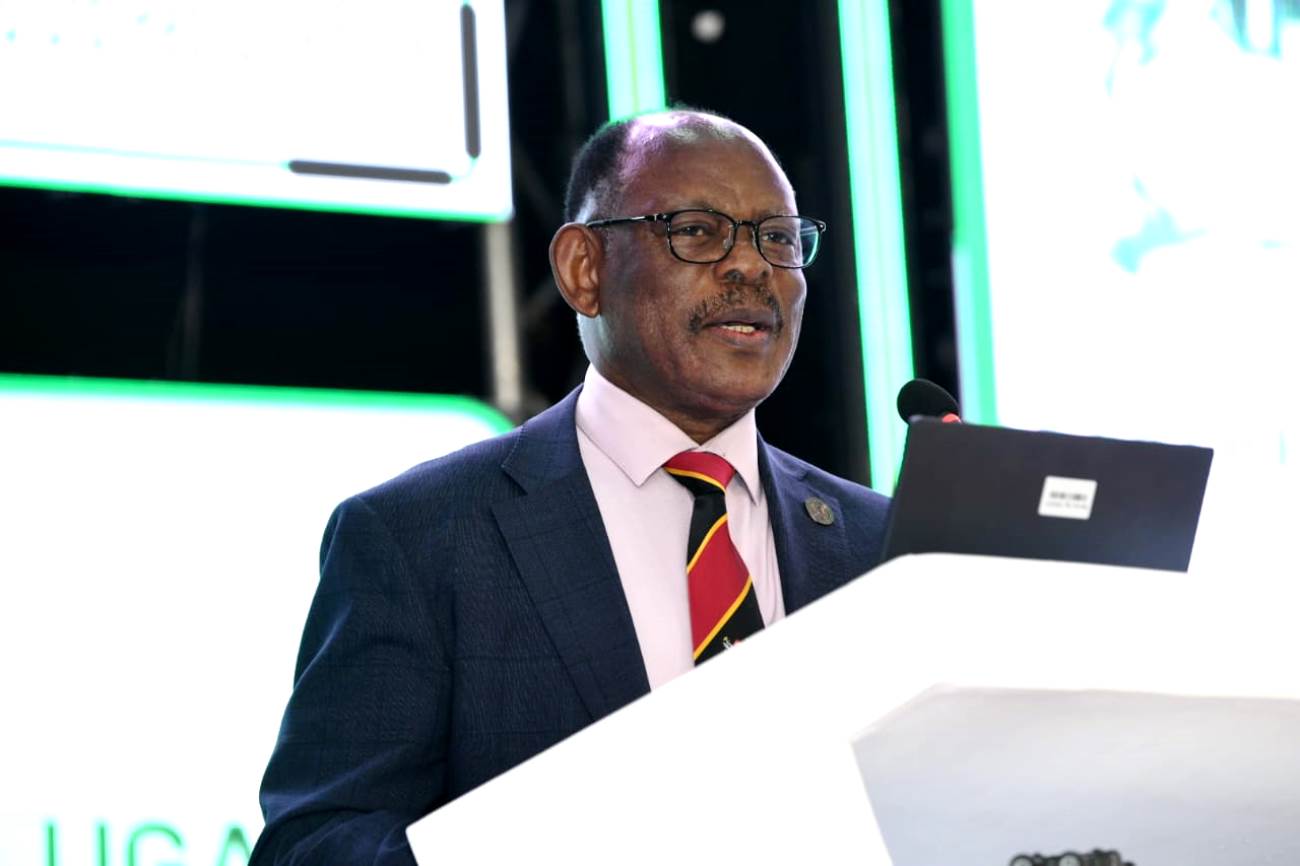
According to Prof. Nawangwe, the Centre of Excellence for Africa Climate-Sensitive Macroeconomic Modelling-is a strategic initiative addressing Africa’s climate, environmental, and fiscal challenges.
Citing Africa’s unique economic realities such as heavy reliance on natural capital, widespread informality and heightened vulnerability to climate shocks, the Centre prioritizes the development of analytical frameworks that are rooted in local contexts rather than merely adapting externally developed models. This approach ensures that policy interventions, recommendations, and investment strategies are firmly grounded in the specific economic, environmental, and social dynamics of African countries.
University-Government collaboration to safeguard Africa
The Vice Chancellor stated that the Centre builds on a strong partnership between Makerere University and the Ministry of Finance, Planning and Economic Development (MoFPED), creating a direct bridge between academic training and real-world policy application. Through this structure, the Centre is preparing a new generation of economists equipped to embed climate considerations into macroeconomic analysis and public financial management.
“Our collaboration with the Ministry stands as an example of how academia and government can work together to strengthen economic management. This partnership has advanced macroeconomic modelling capacity, supported fiscal policy analysis, strengthened public investment management systems and enhanced training for economists and planners across government institutions,” he said.
Prof. Nawangwe observed that African economies remain deeply dependent on natural resources for livelihoods, public revenues and structural transformation, yet these resources are under increasing stress from climate shocks and ecological decline. In this context, he noted that economic transformation can no longer be pursued in isolation from environmental sustainability. The Centre was therefore established to strengthen analytical tools, policy frameworks and institutional capacities that integrate climate risks, natural capital accounting and long-term fiscal resilience into macroeconomic modelling.
He noted that the Centre strengthens Uganda’s contribution to continental and global climate finance and policy platforms, including the Coalition of Finance Ministers for Climate Action (CFMCA) and the Pan-African Coalition of Finance Ministers on Climate Action (PAFMCA). By supporting research, training, policy dialogue and modelling innovation, the Centre positions Makerere University as a regional hub for advancing climate-sensitive macroeconomic policy across Africa.
Capacity-Building Support for Climate and Nature-Resilient Economic Policies
Tackling the role of universities in Climate Fiscal Policy, Prof. Bbaale commended the strong collaboration between Makerere University and government through the Ministry of Finance, Planning and Economic Development, which provides a platform for academia-policy interface.
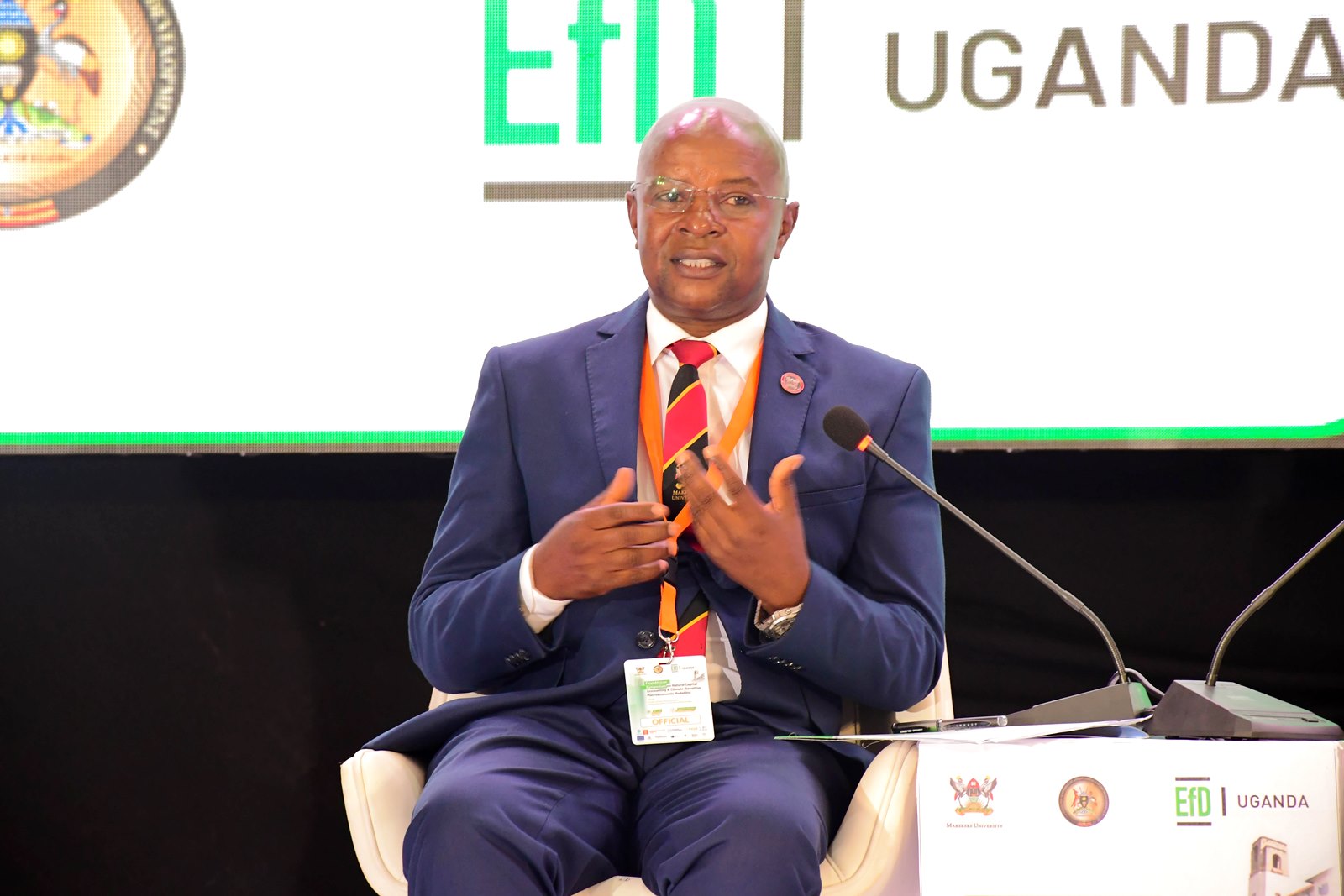
Additionally, the partnership of Makerere University, the College of Business and Management Sciences (CoBAMS), the Environment for Development Initiative (EfD), the Centre of Excellence for Africa Climate-Sensitive Macroeconomic Modelling (CEACM), with the Ministry of Finance, Planning and Economic Development (MoFPED), positions the University, as an active technical partner to the Coalition of Finance Ministers for Climate Action (CFMCA).
Academic training, research and policy engagement
Firmly grounded in Makerere University’s three core pillars of academic training, research, and policy engagement, the Centre brings these pillars to life by equipping students and practitioners with robust analytical skills, producing rigorous and policy-relevant research, and translating evidence into actionable insights that directly inform decisions shaping economies and communities across Africa.
Prof. Bbaale noted that the establishment of independent research centres enables Makerere University to go beyond traditional academic instruction and focus deeply on societal challenges, particularly those related to climate change, environmental degradation, and biodiversity loss.
He reported that the Centre is structured to advance methodological innovation, develop new data systems, and strengthen climate-sensitive macroeconomic tools that are tailored to the African context.
Interventions on Climate issues in Africa
Prof. Bbaale outlined the following interventions being undertaken by Makerere University to address climate issues in Africa.
- Academic anchoring through the Master of Science in Macroeconomic and Investment Modelling at the School of Economics
- Establishment of the Centre of Excellence for Africa Climate-Sensitive Macroeconomic Modelling, which serves as a capacity building arm for PAFMCA
- Research that integrates Natural Capital Assets into National Policy and Fiscal planning
- Capacity building through short term courses at CEACM
- Publications featuring the MoFPED and Makerere University CEACM research efforts
Prof. Bbaale informed the audience that in collaboration with the respective government ministries and sectors, Makerere University is taking the lead in drafting fiscal policy briefs using existing Natural Capital Accounts (NCA) to inform Macro-Fiscal Policies.
CEACM Shaping Uganda’s Policy landscape
Building on to Prof. Bbaale’s presentation, Dr. Peter Babyenda- a member of faculty at the School of Economics, presented the Model for Natural Capital Policy Assessment (MONCAP). With support from GIZ Uganda, the EfD Centre at Makerere University, and the Centre of Excellence for Africa Climate-Sensitive Macroeconomic Modelling, developed the MONCAP model for the Ministry of Water and Environment (MoWE) in collaboration with MoFPED, Uganda Bureau of Statistics (UBOS), National Planning Authority (NPA) among other stakeholders. The MONCAP model represents a holistic government approach to embedding environmental sustainability within national economic planning frameworks.
Dr. Babyenda explained that the model was developed in response to Uganda’s ambitious development trajectory, particularly the country’s 10-fold growth strategy under the National Development Plan. The model integrates natural capital accounting into macroeconomic analysis, thereby enabling policymakers to quantify environmental assets, assess climate risks and emissions, and evaluate how economic activities impact the country’s natural resource base.
Beyond tool development, Dr. Babyenda underscored the Centre’s commitment to capacity building through trainings, short courses, in addition to the Master of Science in Macroeconomic and Investment Modelling, which started this academic year (August 2025).
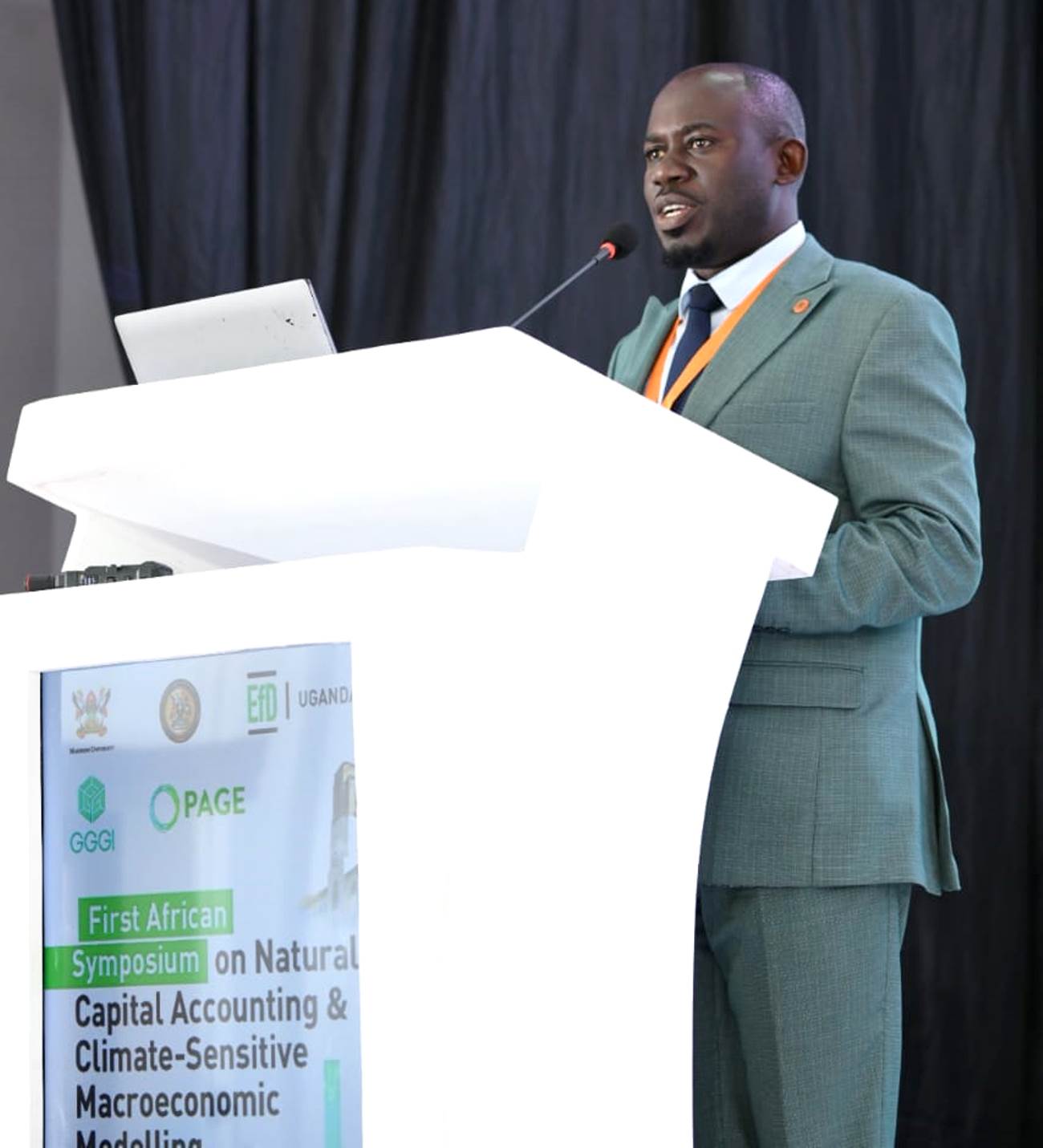
“To ensure capacity and produce more modellers, we are offering short courses on integrating climate and natural capital into macro models, as well as, the Master of Science in Macroeconomic and Investment Modelling. We call for continuous collaboration between policymakers, academia, and development partners so that we can develop more of these models,” he submitted.
Integrating data into macroeconomic models
Dr. Wilson Asiimwe, Senior Lecturer at the School of Economics, stressed the importance of integrating climate and natural capital data directly into macroeconomic models. He explained how forests, water, fisheries and land, which are vital for GDP and carbon sequestration, can be systematically incorporated into tools such as multiplier and CGE models using an Environmental Social Accounting Matrix.
“The first step is preparing the Social Accounting Matrix that captures all economic transactions in an economy—the demand and supply relationships among all economic agents. To integrate climate issues into CGE or multiplier models, you must map climate and natural capital data onto the existing Social Accounting Matrix of the country,” he said.
He elaborated that these models allow policymakers to simulate policy scenarios from forestry investments and infrastructure development to energy transitions, linking environmental outcomes to GDP, employment, revenue, and sectoral performance. By capturing emissions, resource use, and climate risks, Dr. Asiimwe emphasized that this approach provides actionable insights for sustainable growth, green investment, and climate-resilient planning in Uganda.
Symposium Outlook
By hosting the inaugural African Symposium on Natural Capital Accounting and Climate-Sensitive Macroeconomic Modelling, the Centre of Excellence for Africa Climate-Sensitive Macroeconomic Modelling (CEACM-established in August 2025) reinforced its role as a continental hub for research, training, and policy dialogue. The symposium was supported by the Global Green Growth Institute (GGGI) and the Partnership for Action on Green Economy (UN PAGE), with thanks to the generous contribution of its funding partners -European Union, Germany, Finland, Norway, Korea, Sweden, Denmark, and Switzerland.
Business & Management
Makerere Hosts Second Cohort of MoKCC&MA Procurement Officers for E&S Safeguards Training
Published
2 days agoon
February 18, 2026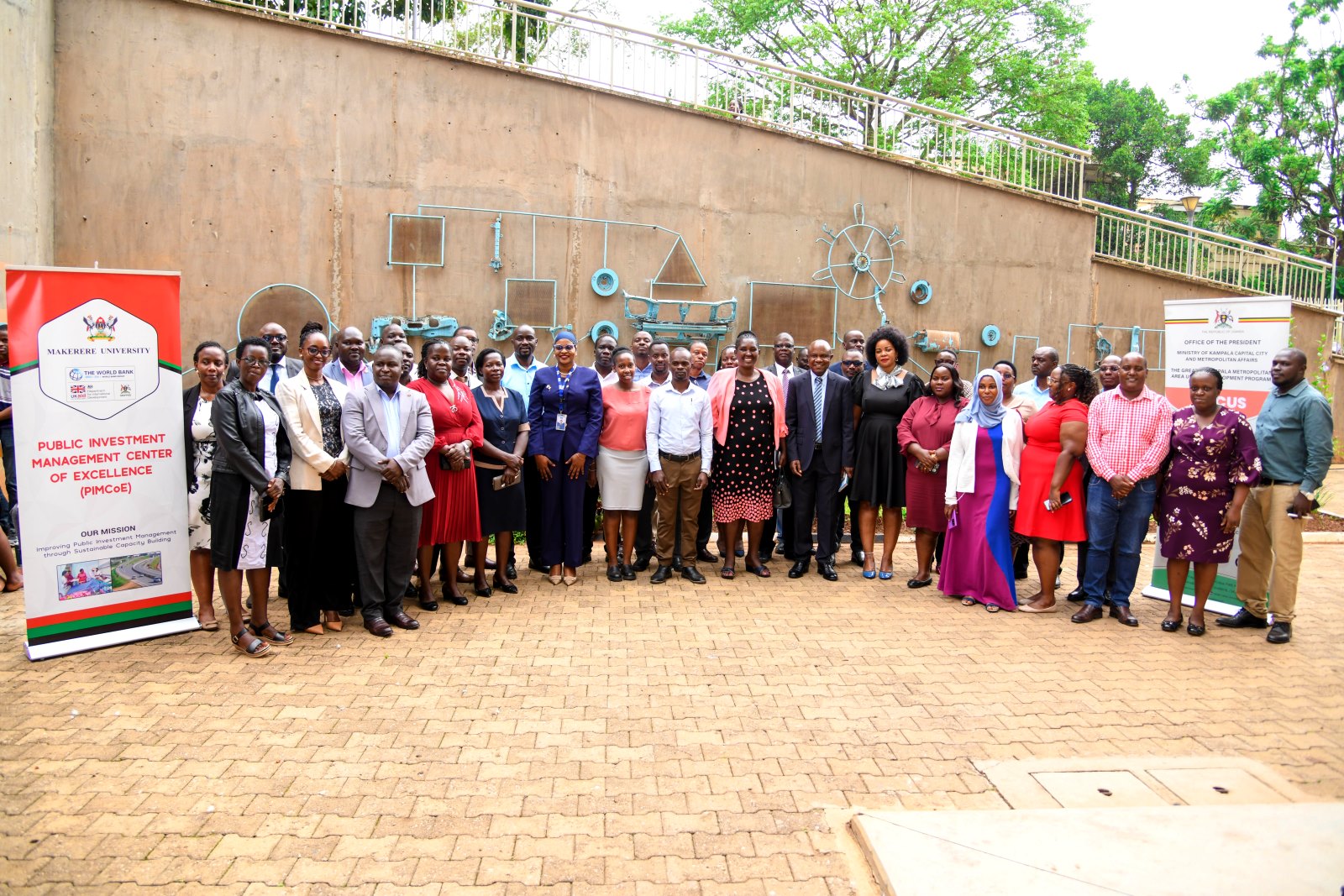
The second cohort of procurement and project officers from the Ministry of Kampala Capital City and Metropolitan Affairs (MoKCC&MA) has commenced a four-day training in Integrating Environmental and Social (E&S) Safeguards in the Procurement Cycle at Makerere University.
The training, which started on 17th February, is being conducted by the Public Investment Management (PIM) Centre of Excellence and brings together officers from Kampala Capital City Authority (KCCA), Entebbe Municipality, Kira Municipality, Mpigi District Local Government, and Wakiso District Local Government.
The programme was officially opened by the Under Secretary of MoKCC&MA, Ms. Monica Edemachu Ejua.
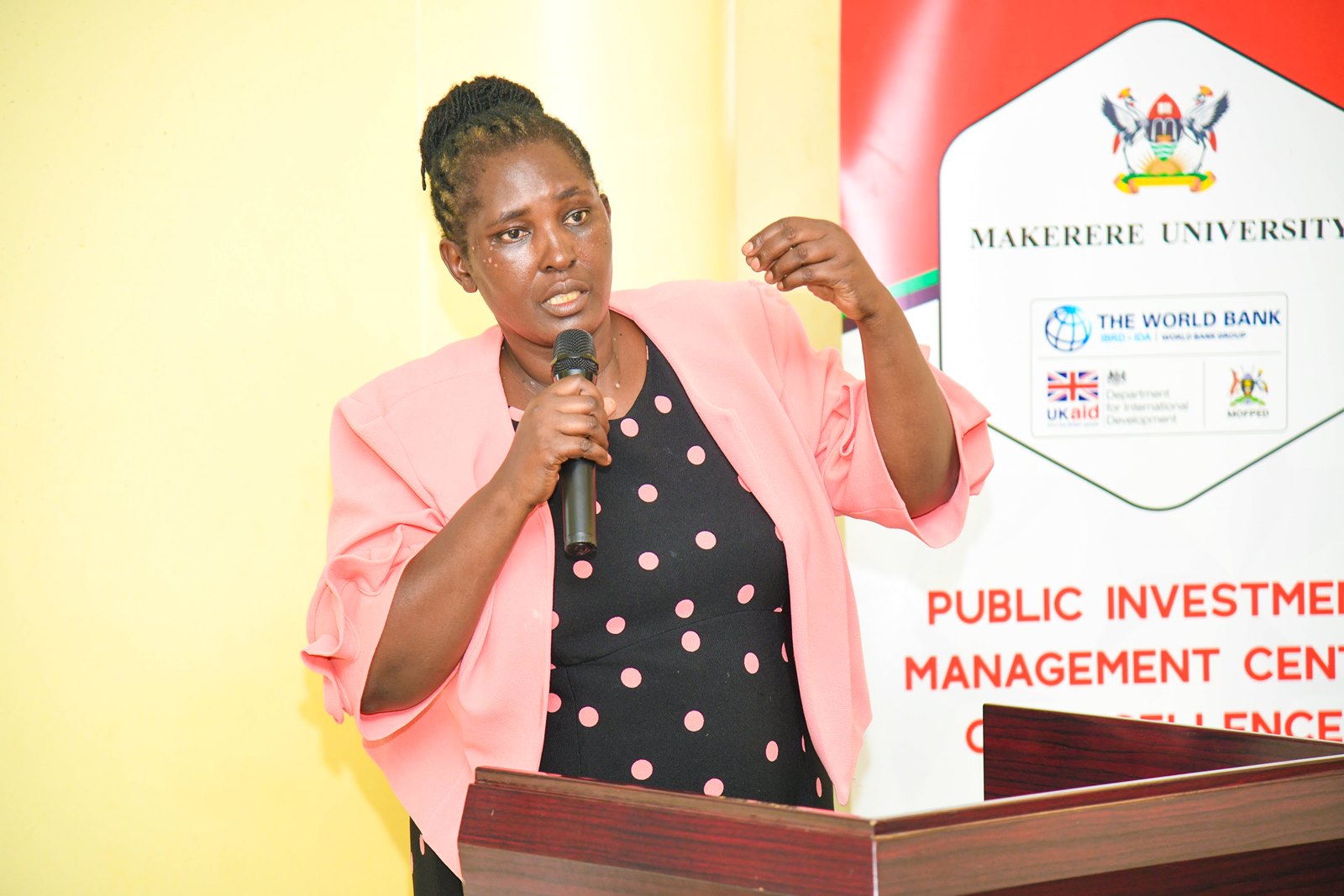
In her opening remarks, Ms. Ejua thanked Makerere University for strengthening the Ministry’s capacity and bringing on board facilitators with hands-on experience. She emphasized that the training is critical for effective implementation of the Greater Kampala Metropolitan Area Urban Development Programme (GKMA-UDP), which operates under a results-based financing framework.
Drawing from personal experience, she underscored the importance of mainstreaming environmental and social safeguards into government operations and even into school curricula. Using practical examples, from poor waste management practices to unsafe project sites—she highlighted the real-life consequences of weak compliance, including fatalities, environmental degradation, and social injustices.
She cited recent incidents within the GKMA programme, noting that failure to manage environmental and social risks can lead to suspension of project sites and reputational damage.
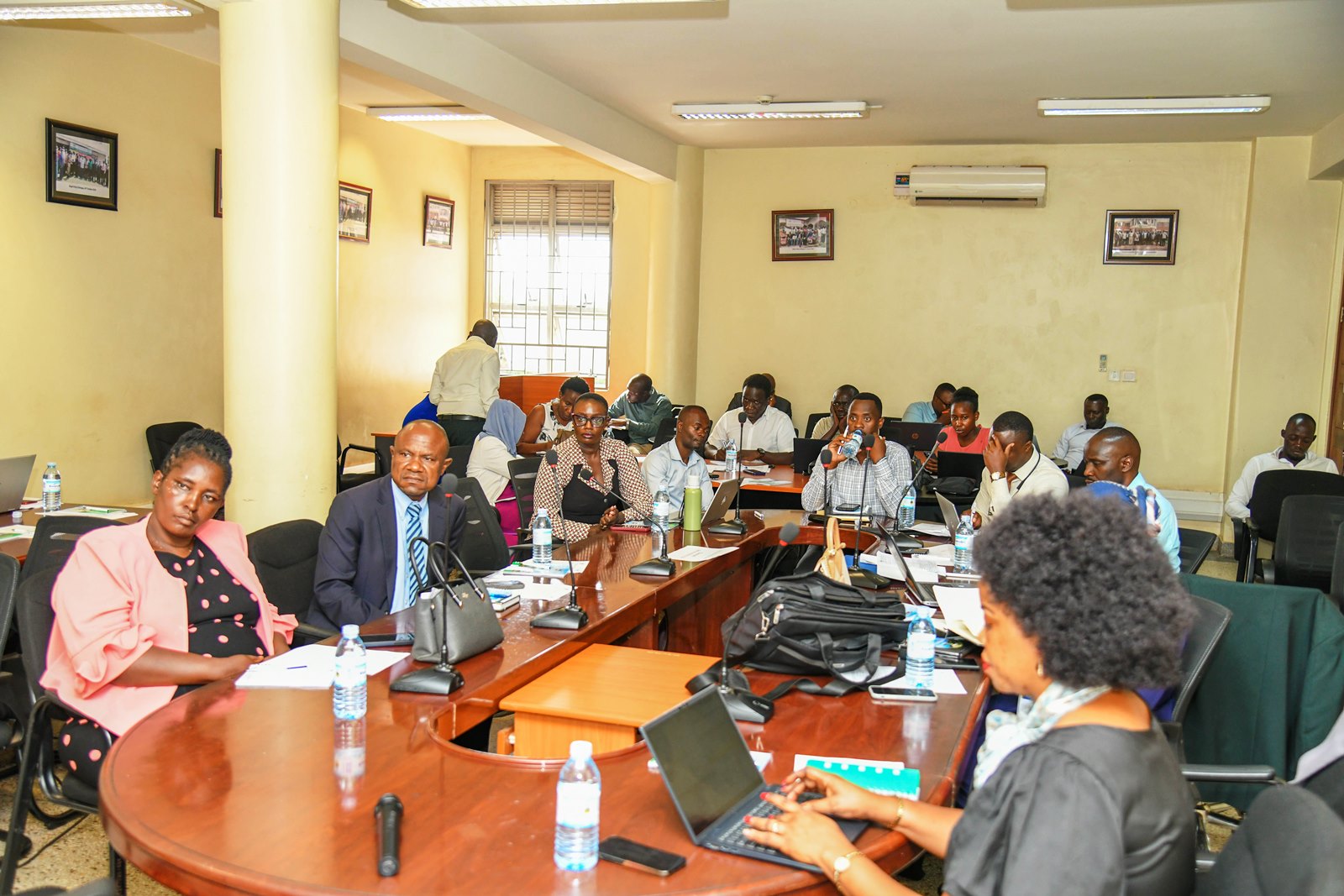
“We would rather prevent than deal with the death of somebody. Contractors know how expensive it is to deal with fatalities,” she stressed.
Ms. Ejua further challenged procurement professionals to recognize their central role in government performance.
“Procurement is the engine of government business. If it is not well managed from planning, the end result will be bad. But if we plan well, we shall end well,” she said.
She called for greater engagement with communities during project implementation and urged officers to become ambassadors of sustainable development beyond the classroom.
Strengthening the Public Investment Cycle
Welcoming participants, the Deputy Director of the PIM Centre of Excellence, Prof. Eria Hisali, emphasized that integrating environmental, social, health and safety considerations is as important as assessing financial and economic feasibility.
He noted that since 2009/2010, the Government of Uganda has allocated a significant share of its national budget—averaging 40–45 percent—towards capital development projects. Such large-scale investments, he said, demand robust systems to ensure value for money and sustainability across the entire public investment management cycle.
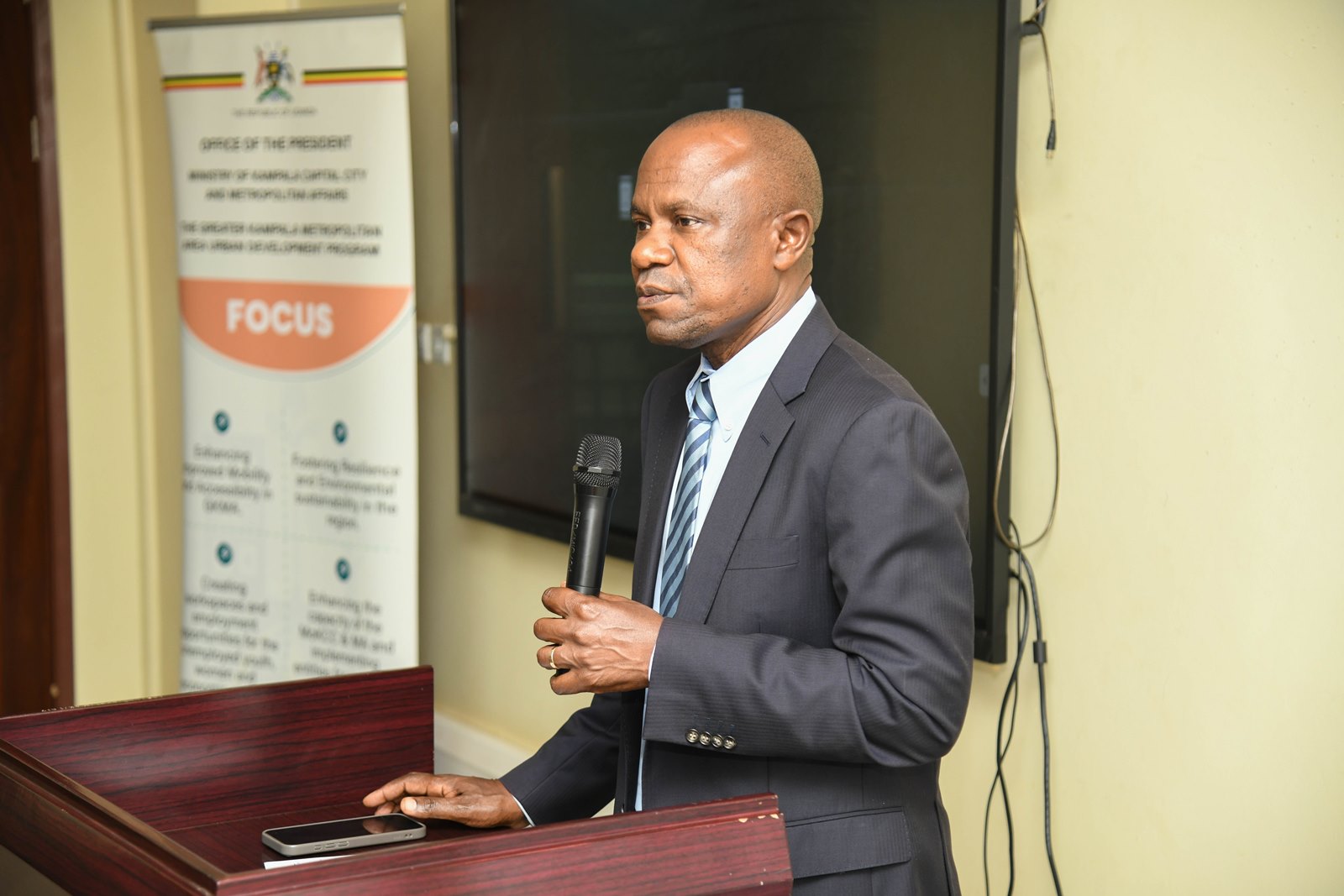
“Public investment management is not only about feasibility studies. It includes ideation, procurement, monitoring and evaluation, and sustainability considerations,” Prof. Hisali explained.
He encouraged participants to quantify the costs of non-compliance, including the economic implications of fatalities and environmental damage, arguing that evidence-based decision-making strengthens accountability and action.
World Bank Support and System Strengthening
Representing, the funding agency, Ms Maliam Acio Aalangdong, a Social Development Specialist from the World Bank, commitment to strengthening country systems for environmental and social risk management.
She revealed that Uganda’s World Bank portfolio currently stands at approximately USD 4.9 billion, making effective safeguards management a priority. She explained that projects are now governed under the Environmental and Social Framework (ESF), which places strong emphasis on integrating risk mitigation measures from project design through implementation.
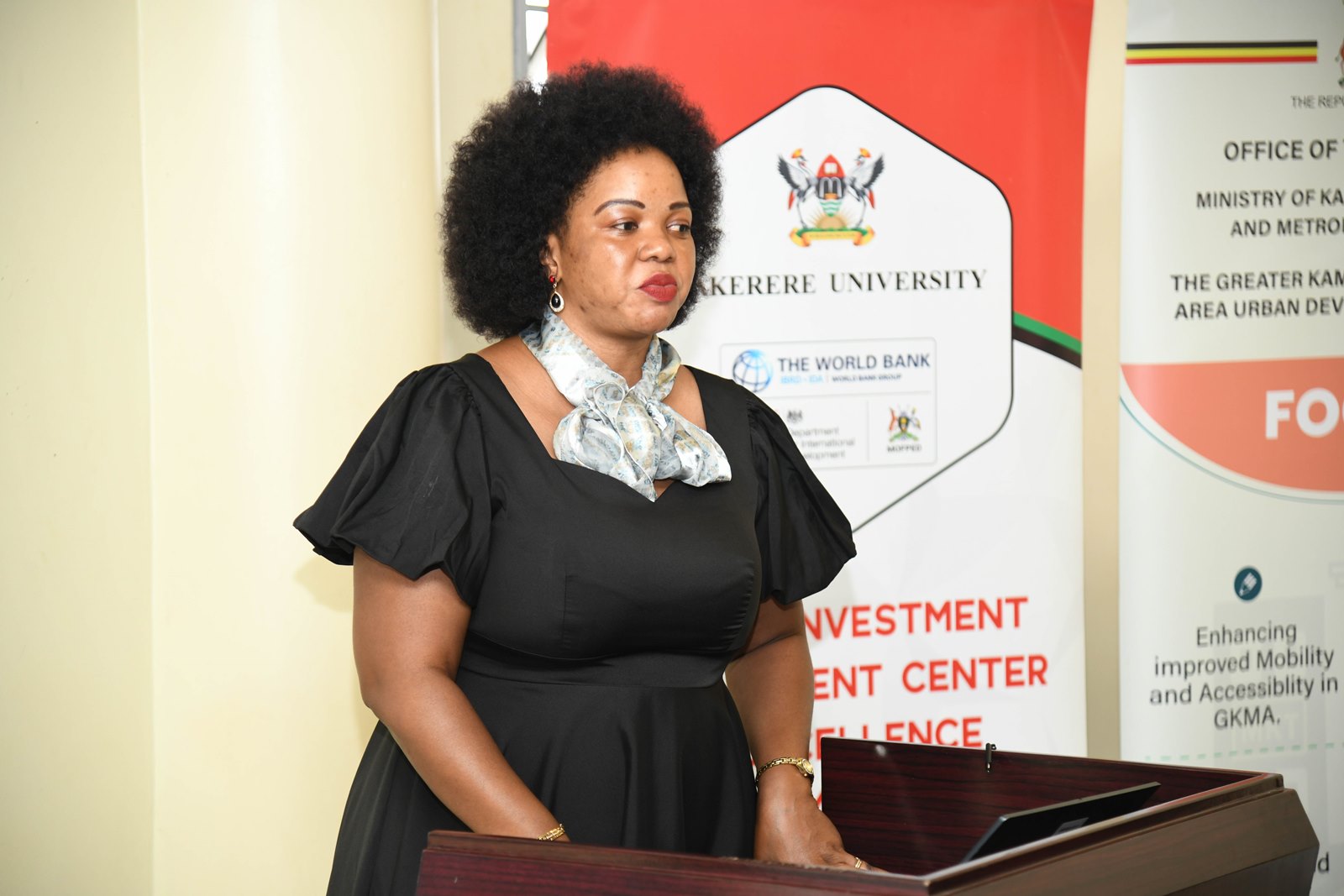
Ms. Acio noted that previous assessments identified gaps in upstream mainstreaming of E&S issues, stakeholder engagement, land acquisition management, and social risk coverage. The partnership with Makerere University and other institutions aims to address these gaps through structured training and professional development.
She also highlighted that fatalities recorded under some projects in Uganda—including six in a single year under GKMA—underscore the urgency of building stronger compliance and monitoring systems.
Training Objectives
Presenting the objectives of the training, Dr. Bruce Rukundo from MoKCC&MA explained that the programme focuses on strengthening participants’ ability to systematically integrate environmental, social, health and safety (ESHS) considerations into all stages of the procurement cycle.
Participants will be equipped to:
- Identify and map E&S risks during project planning and procurement;
- Draft and review bidding documents that reflect E&S obligations, including occupational safety, labour management, and gender-based violence safeguards;
- Apply objective criteria in bid evaluation to ensure compliance;
- Monitor contractor performance using inspections, checklists, and reporting tools;
- Take timely corrective action during project implementation.
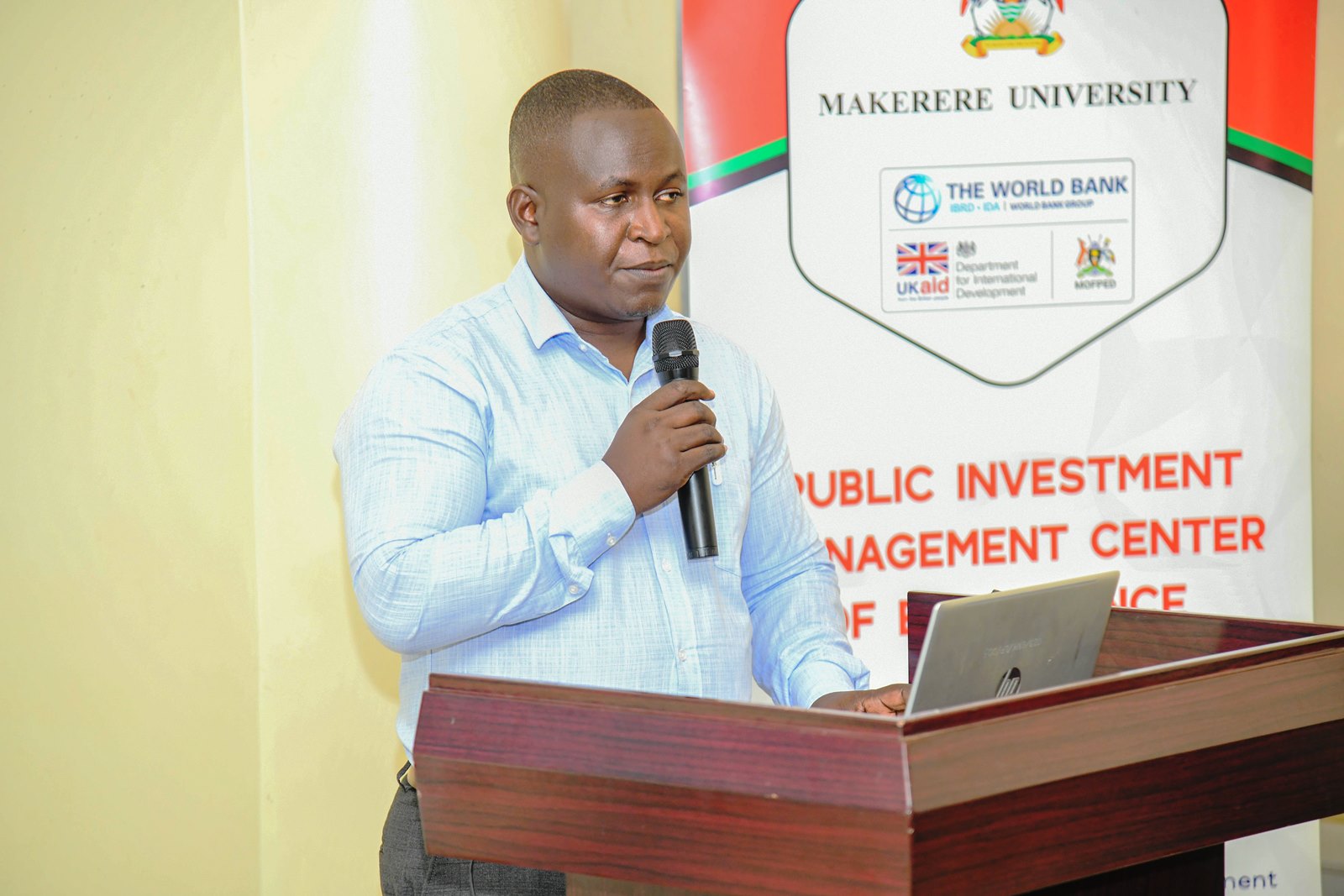
Dr. Rukundo emphasized that while contractors are responsible for compliance on site, the borrower remains ultimately accountable for managing environmental and social risks.
Expanding the Impact
Dr. Jude Mugarura, Lead Trainer, noted that the first cohort completed its training successfully the previous week. The second cohort expands participation to additional metropolitan entities, with an expected total of about 40 participants.
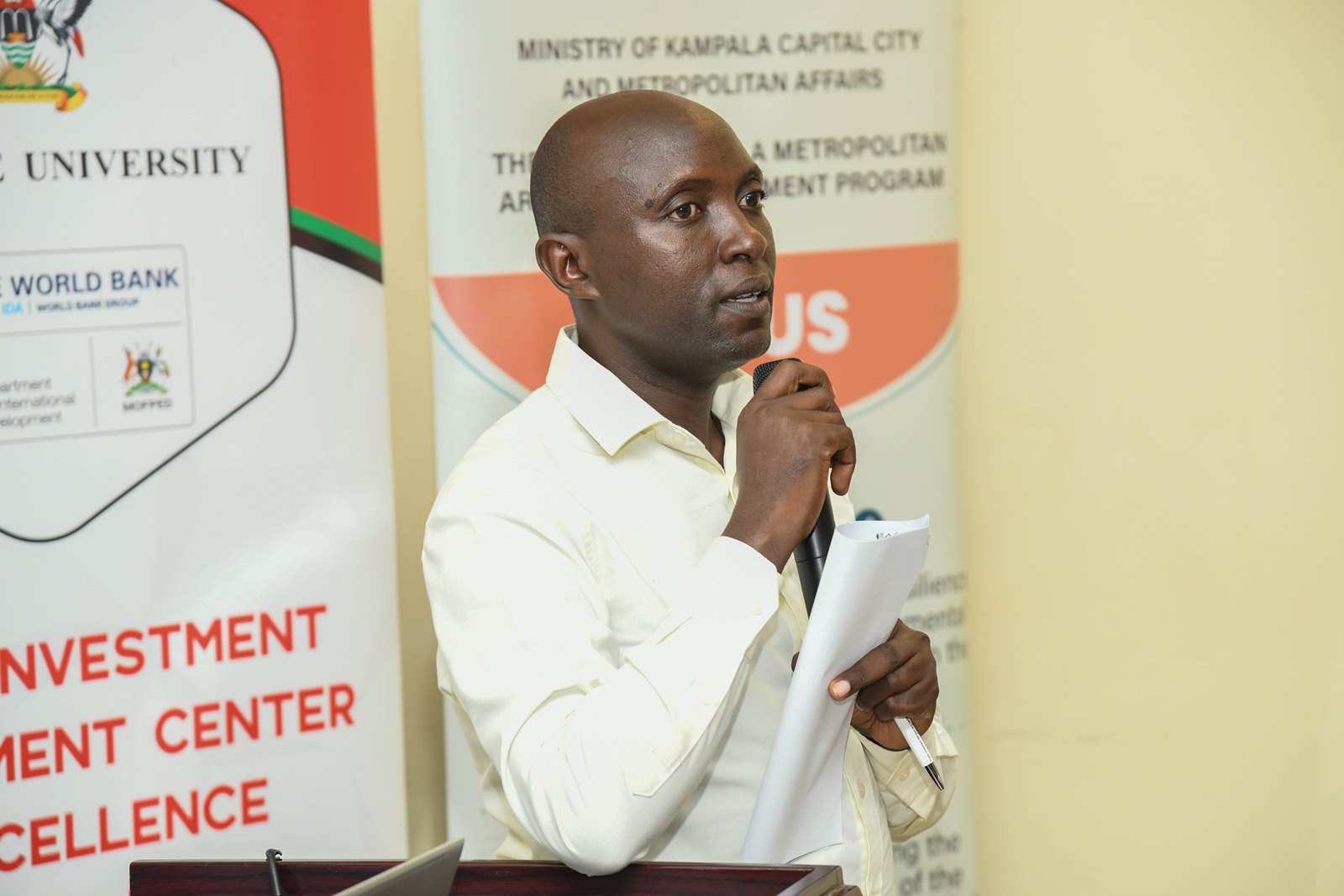
He reiterated that the training is part of a broader strategy to institutionalize environmental and social safeguards within Uganda’s public investment management systems. As the second cohort embarks on the four-day programme, participants have been urged to not only earn certificates but to translate knowledge into action, ensuring safer, more sustainable infrastructure development across the Greater Kampala Metropolitan Area and beyond.
Business & Management
PIM Centre Awards Certificates to MoKCC&MA Officers after Safeguards Training
Published
7 days agoon
February 13, 2026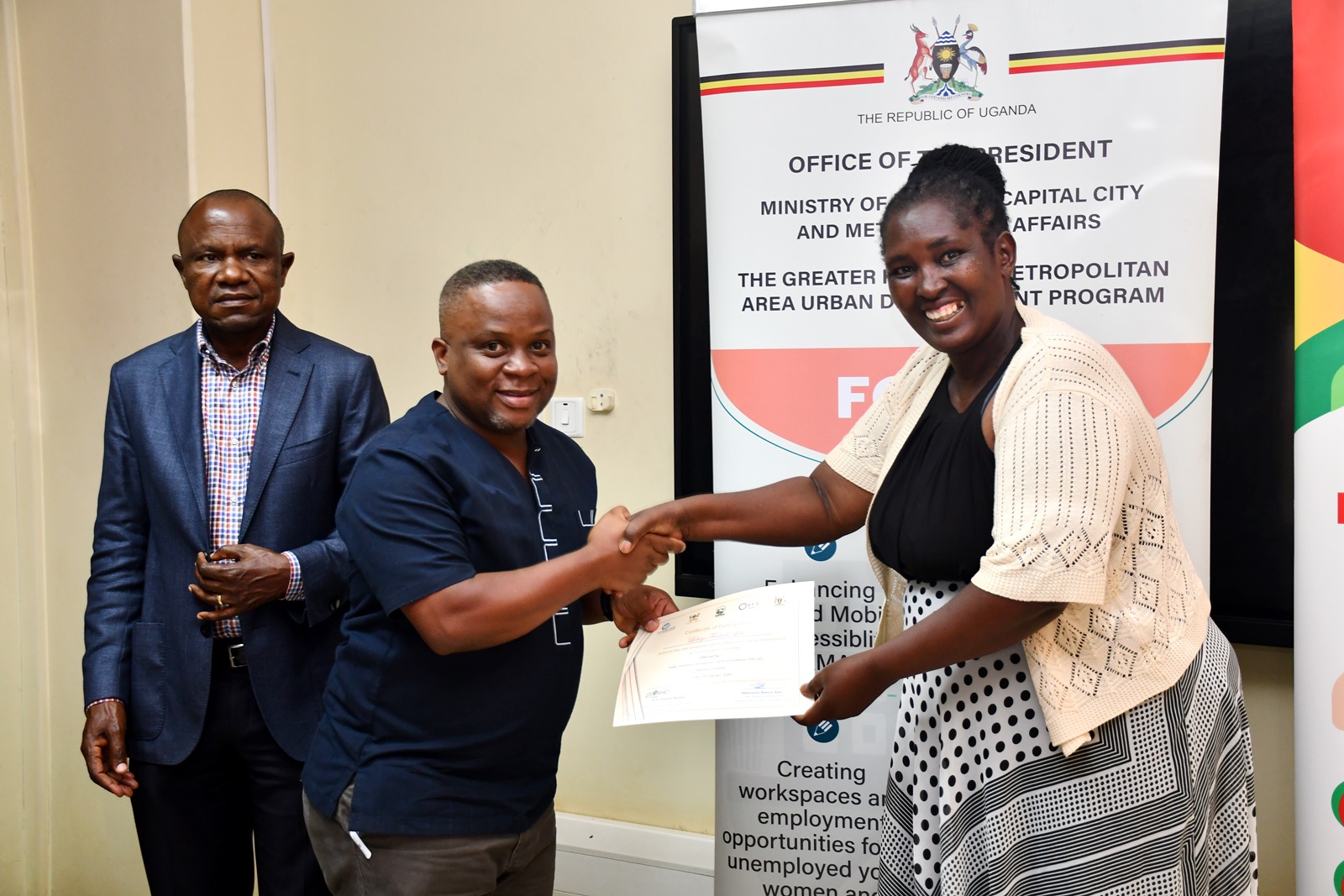
The Makerere University Public Investment Management (PIM) Centre of Excellence has awarded certificates to over 30 officers from the Ministry of Kampala Capital City and Metropolitan Affairs (MoKCC&MA) following the successful completion of a four-day training on Managing Environmental and Social Safeguards in the Procurement Cycle.
The certificate award ceremony, held on February 13, 2026 was presided over by the Under Secretary of MoKCC&MA, Ms. Monica Edemachu Ejua, and attended by university leaders, facilitators, and development partners.
Building Sustainable Procurement Systems
Delivering remarks on behalf of the Principal of the College of Business and Management Sciences (CoBAMS), Prof. Eria Hisali congratulated the participants for pioneering the programme and reaffirmed the PIM Centre’s commitment to strengthening public investment management across the entire project cycle.
Prof. Hisali traced the origins of the PIM Centre to the 2020/2021 financial year, when it was established with initial support from the British Government under a World Bank trust fund. He explained that the Centre was created to equip public sector officials with skills to assess the financial and economic viability of public investment projects.
“We started by focusing on whether projects make financial and economic sense. But public investment management goes beyond feasibility. It includes procurement, monitoring and evaluation, and sustainability considerations,” he noted.
He emphasized that procurement professionals serve as critical gatekeepers in ensuring value for money in public projects. However, he added that modern procurement must go beyond cost considerations to integrate environmental and social sustainability.
“This training marks an important step in mainstreaming sustainability issues into procurement processes,” Prof. Hisali said.
First Cohort of a World Bank-Initiated Programme
Dr. Jude Mugarura, the Lead Trainer, highlighted that development of the training module began three years ago at the initiative of the World Bank. The programme brought together experts from multiple institutions and disciplines, including three colleges at Makerere University—CoBAMS, the College of Agricultural and Environmental Sciences, and the College of Humanities and Social Sciences—working under the PIM Centre of Excellence.
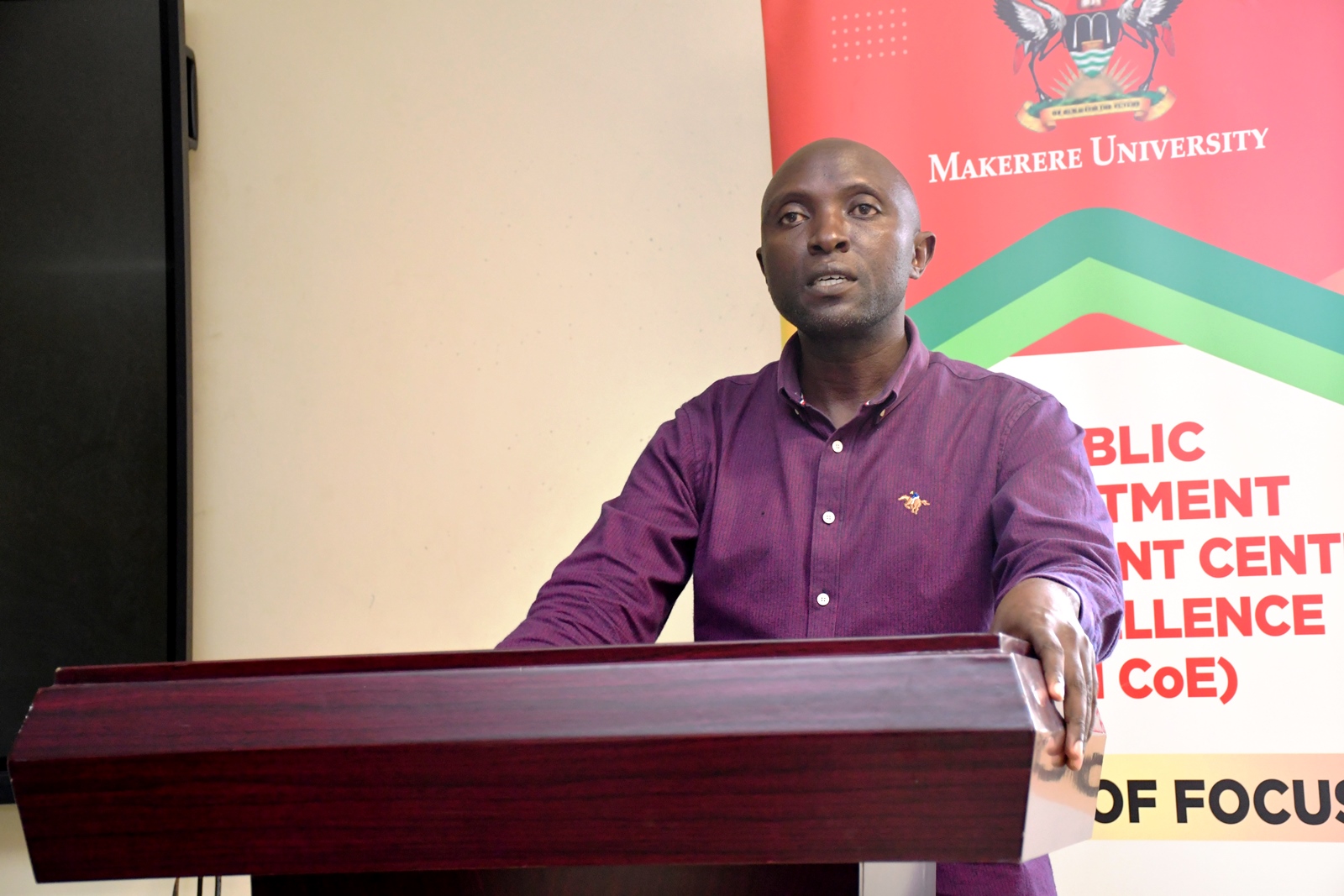
Facilitators also included experts from the Public Procurement and Disposal of Public Assets Authority (PPDA), corporate practitioners, and specialists from the World Bank.
Dr. Mugarura noted that the MoKCC&MA officers formed the first cohort to receive the training, positioning them at the forefront of integrating environmental and social safeguards into procurement practices.
“We appreciate the World Bank for coordinating the development of these materials and supporting the training. We are proud that you are the first group to benefit from this internationally benchmarked programme,” he said.
Call for Practical, Impact-Oriented Training
In her closing remarks, Under Secretary Monica Edemachu Ejua thanked Makerere University and the facilitators for dedicating time and expertise to build the capacity of ministry staff.
She described the training as timely and strategic, noting that it lays a strong foundation for implementation of the Greater Kampala Metropolitan Area Urban Development Programme, as well as other government initiatives.
“This training is not just about one programme. It sets the foundation for sustainability in government projects,” she said.
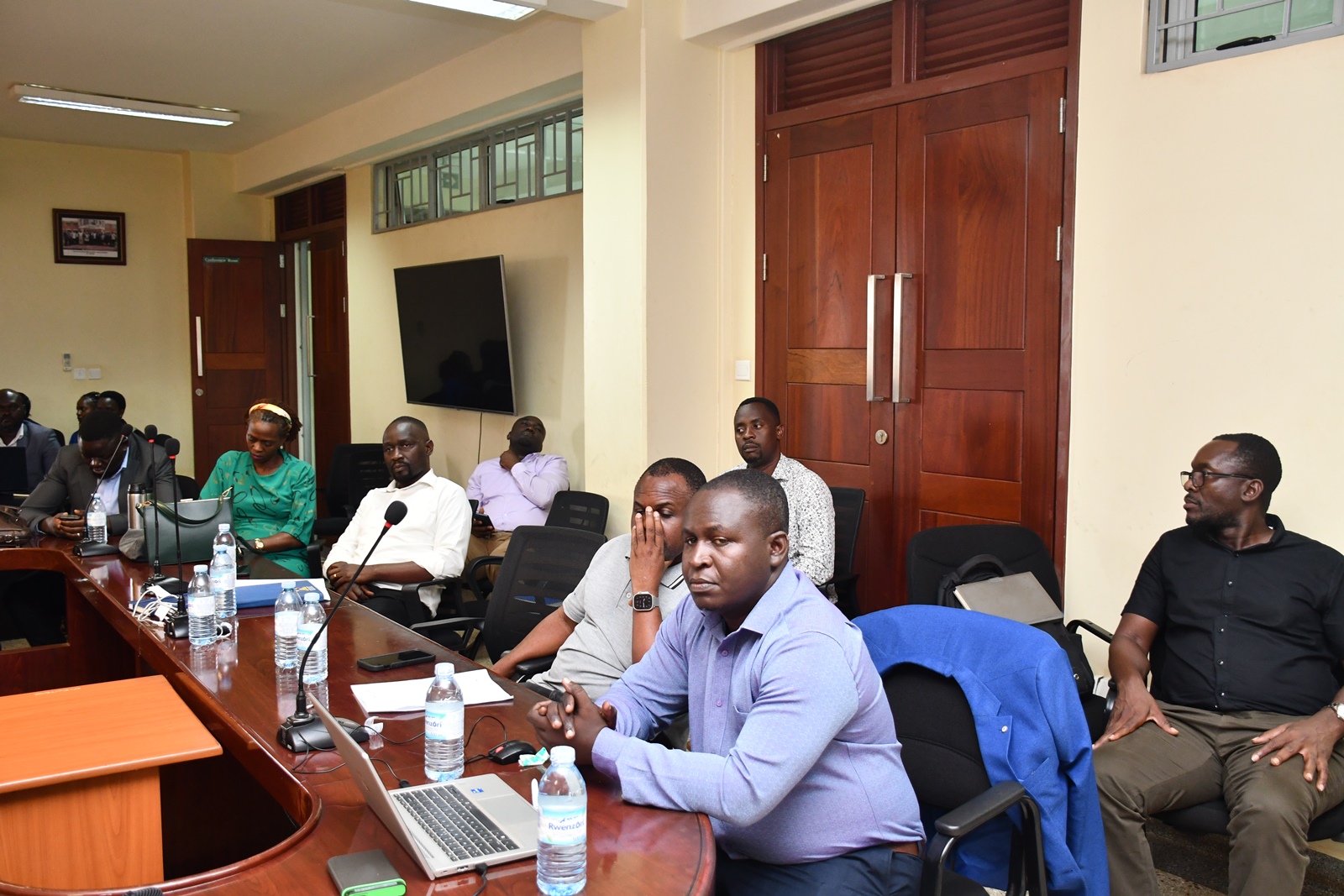
The Under Secretary challenged universities to strengthen practical components in their curricula to better prepare graduates for the demands of public service. She underscored the importance of collaboration between academia and government in addressing national challenges such as waste management, environmental protection, and sustainable urban development.
“Developed countries have worked closely with academia to solve their problems. As government, we must continue partnering with institutions like Makerere to find practical solutions to our challenges,” she emphasized.
She further reminded participants of their responsibility as public officers to promote patriotism, accountability, and sustainability in service delivery.
Expanding the PIM Offering
The training forms part of the PIM Centre’s broader strategy to expand its offerings beyond project appraisal to cover the entire public investment management cycle. Going forward, the Centre plans to deliver modular programmes covering procurement, monitoring and evaluation, project conceptualization, and sustainability integration. The ceremony concluded with the award of certificates to participants and facilitators, marking another milestone in Makerere University’s contribution to strengthening public sector capacity and promoting sustainable public investment in Uganda.
Trending
-

 Agriculture & Environment2 weeks ago
Agriculture & Environment2 weeks agoFrom Adversity to Excellence: The Inspiring Journey of Makerere’s Best Science Student, Esther Ziribaggwa
-

 General1 week ago
General1 week agoAptitude Exam (Paper 1) Results for the Mature Age Entry Scheme 2026/2027
-

 Health2 weeks ago
Health2 weeks agoDr. Samalie Namukose and the Quiet Work of Making Nutrition Count
-

 Research2 weeks ago
Research2 weeks agoCall for PhD Student Fellowships under H-DATA
-

 Health2 weeks ago
Health2 weeks agoHow Jimmy Osuret Turned Childhood Trauma into Evidence for Safer School Crossings
